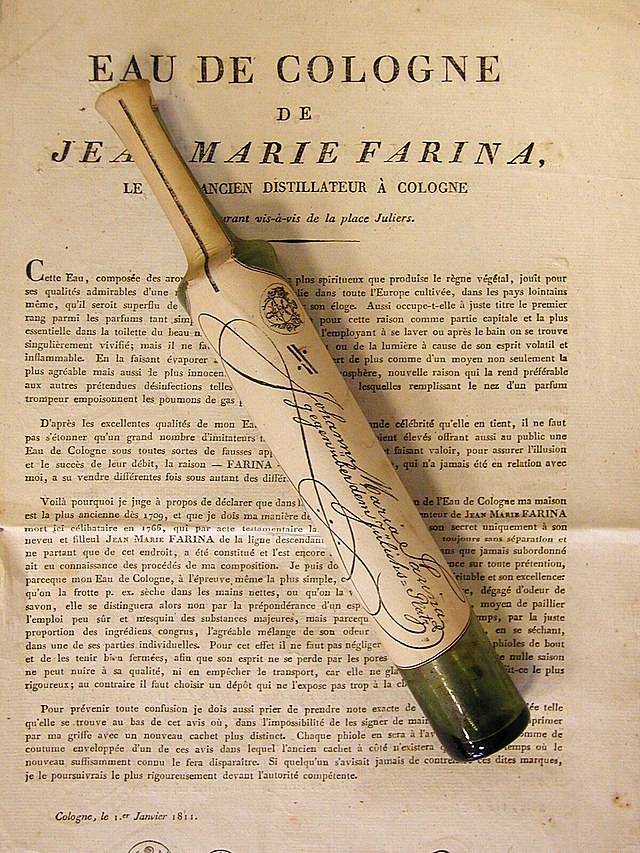Eau de Cologne
Type of perfume From Wikipedia, the free encyclopedia
Eau de Cologne (French: [o d(ə) kɔlɔɲ]; German: Kölnisch Wasser [ˈkœlnɪʃ ˈvasɐ]; meaning "Water from Cologne") or simply cologne is a perfume originating in Cologne, Germany.[1] Originally mixed by Johann Maria Farina (Giovanni Maria Farina) in 1709, it has since come to be a generic term for scented formulations in typical concentration of 2–5% and also more depending upon its type of essential oils or a blend of extracts, alcohol, and water.[2] In a base of dilute ethanol (70–90%), eau de cologne contains a mixture of citrus oils, including oils of lemon, orange, tangerine, clementine, bergamot, lime, grapefruit, blood orange, bitter orange, and neroli. It can also contain oils of lavender, rosemary, thyme, oregano, petitgrain (orange leaf), jasmine, olive, oleaster, and tobacco.
In contemporary American English usage, the term "cologne" has become a generic term for perfumes marketed toward men. It also may signify a less concentrated, more affordable, version of a popular perfume.
History
Summarize
Perspective

The original Eau de Cologne is a spirit-citrus perfume launched in Cologne in 1709 by Giovanni Maria Farina (1685–1766), an Italian perfume maker from Santa Maria Maggiore, Valle Vigezzo. In 1708, Farina wrote to his brother Jean Baptiste: "I have found a fragrance that reminds me of an Italian spring morning, of mountain daffodils and orange blossoms after the rain".[3] He named his fragrance Eau de Cologne, in honour of his new hometown.[4]
The Eau de Cologne created by Farina was used only as a perfume and delivered to "nearly all royal houses in Europe".[5] His ability to produce a constantly homogeneous fragrance consisting of dozens of monoessences was seen as a sensation at the time. A single vial of this aqua mirabilis (Latin for miracle water) cost half the annual salary of a civil servant.[4] When free trade was established in Cologne by the French in 1797, the success of Eau de Cologne prompted countless other businessmen to sell their own fragrances under the name of Eau de Cologne. Giovanni Maria Farina's formula has been produced in Cologne since 1709 by Farina opposite the Jülichplatz[4] and to this day remains a secret. His shop at Obenmarspforten opened in 1709 and is the world's oldest fragrance factory.
The Original Eau de Cologne 4711 is named after its location at Glockengasse No. 4711. It was also developed in the 18th century by Wilhelm Mülhens and produced in Cologne since at least 1799 and is therefore probably one of the oldest fragrances still produced in the world. On 12 December 2006, the perfumes and cosmetics company Mäurer & Wirtz took over 4711 from Procter & Gamble and has expanded it to a whole brand since then.
In 1806, Jean Marie Joseph Farina, a great-grand-nephew of Giovanni Maria Farina, opened a perfumery business in Paris that was later sold to Roger & Gallet. That company now owns the rights to Eau de Cologne extra vieille, in contrast to the Original Eau de Cologne from Cologne. Originally the water of Cologne was believed to have the power to ward off bubonic plague.[6] By drinking the cologne, the citrus oil scent would exude through the pores, repelling fleas. Many flea shampoos for dogs are based on citrus oils today.
In modern times, eau de Cologne or "cologne" has become a generic term. The term "cologne" can be applied to perfume for men or women, but in American English, usage typically refers to perfumes marketed toward men.
- 4711 (1885)
- Troinoj (1889)
- Cordon Rouge, François Coty (1909)
- Cordon Vert, François Coty (1905)
Cologne in Turkish culture
After the fame of the cologne became widespread, Farina's cologne was brought to the Ottoman Empire during the reign of Abdülhamid II. It was common to offer rose water to guests in the Ottoman Empire at that time, but the tradition of offering cologne began after it became popular there. In 1882, the first local cologne was produced in the Ottoman Empire by Ahmet Faruk. Eau de Cologne, which is called odikolon by the people, has taken the name of cologne over time. Even after the collapse of the Ottoman Empire, the habit of cologne did not end in Turkey. On the contrary, it became a culture that was passed on from generation to generation. Currently, in most houses in Turkey, cologne is offered to guests every time they visit.[7]
Literary references
Yevgeny Yevtushenko's poem About Drinking describes the author coming back from a whaling voyage and arriving at a small town where the local store is out of liquor and, as a substitute, they use a case of Eau de Cologne to drink.[8]
See also
Bibliography
- Fenaroli, Giovanni; Maggesi, L. (1960). "Acqua di Colonia". Rivista italiana essenze, profumi, piante offizinali, olii vegetali, saponi (in Italian). 42.
- La Face, Francesco (1960). "Le materie prime per l'acqua di colonia". Relazione al Congresso di Sta. Maria Maggiore (in Italian).
- Monk, Paul M. S. (May 2004). Physical Chemistry: Understanding Our Chemical World. Wiley. ISBN 978-0-471-49181-1.
- Sabetay, Sébastien (1960). Les Eaux de Cologne Parfumée. Sta. Maria Maggiore Symposium (in French).
- Wells, Frederick V. (1960). Variations on the Eau de Cologne Theme. Sta. Maria Maggiore Symposium.
- Wells, Frederick V.; Billot, Marcel (1981). Perfumery Technology. Art, science, industry. Chichester: Horwood Books. pp. 25, 278. ISBN 0-85312-301-2.
- Wilhelm, Jürgen, ed. (2005). Das große Köln-Lexikon (in German). Cologne: Greven Verlag. ISBN 3-7743-0355-X.
References
External links
Wikiwand - on
Seamless Wikipedia browsing. On steroids.





